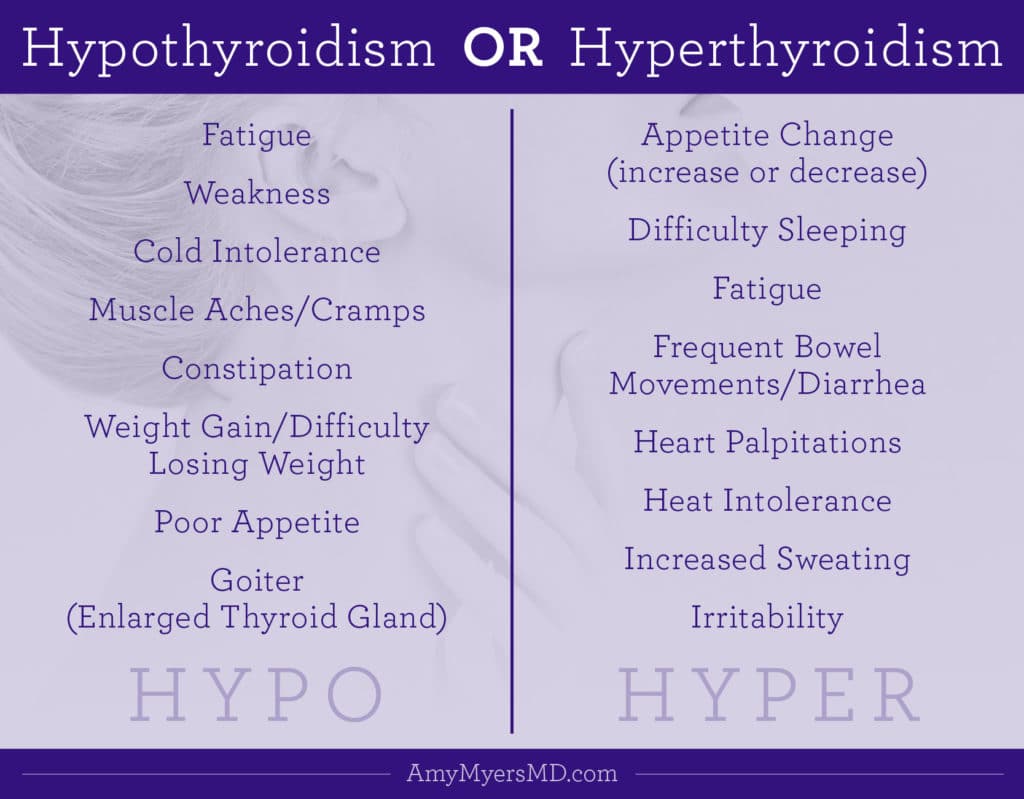For those of us raised on a low-fat diet, it may have taken a while to understand that there are different kinds of fats, and they are truly good for us! We know fats are critical for brain development and cell growth, and we’re aware that some fats lower bad cholesterol and offer protection from coronary artery disease and other cardiovascular issues. But what about their impact on other body systems? You may be surprised to learn that your thyroid benefits from the right kinds of fats, too.
Your thyroid is a 2-inch-long, butterfly-shaped gland that sits at the base of your neck. It’s the “mastermind” of your metabolism and a key component of your cardiac and digestive function, muscle control, brain development, and even your mood through the production of the T3 and T4 hormones. Let me walk you through the different types of fats, and then I can explain how this relates to your thyroid.
[lwptoc]
Good Fats vs. Bad Fats
For the most part, fats can be divided into two kinds: saturated and unsaturated fats. Saturated fats come mainly from animal sources such as red meat, poultry, and full-fat dairy products. Some data suggests that when consumed in excess, they can drive up total cholesterol, particularly the more harmful LDL cholesterol, which can prompt blockages to form in arteries in the heart. However, a recent meta-analysis of 21 studies said that there was not enough evidence to conclude that saturated fat increases the risk of heart disease.1
On the other hand, unsaturated fats—polyunsaturated fats and monounsaturated fats—can help lower LDL cholesterol levels and reduce your risk of heart disease. Omega-3s are one type of polyunsaturated fat and are called an “essential” fatty acid. The human body can’t make these, so we have to obtain them through our diet. Omega-3s are further broken down into three major essential fatty acids. Alpha-linolenic acid (ALA) is found in plants. Two other types, eicosapentaenoic acid (EPA) and docosahexaenoic acid (DHA), are found in fish and are most readily used by your body.
There are lots of reasons why fatty acids are important to our health. First, they’re the main components of the cell membranes. They’re also used in the production of prostaglandins, which are similar to hormones. Prostaglandins are involved in cell growth, vascular health, and in regulating a healthy inflammatory response.
This healthy response to inflammation is the key. The root cause of many chronic illnesses is inflammation.2 Chronic inflammation has been linked to autoimmunity, gut issues, cancer, cardiovascular issues, depression, pain, swelling, and more. The toxins that surround us in our modern world, our sedentary lifestyles, and the processed, chemical-laden foods in our Western diet contribute to inflammation. Thyroid dysfunction is rooted in chronic inflammation.
Thyroid Disorders
Many conventional doctors often attribute the signs of thyroid dysfunction to aging, depression, or stress. And even when properly diagnosed, the treatment is often harsh drugs or even the removal or destruction of the gland. To learn more about your thyroid and how getting it to a healthy state through natural methods will help you lose weight, think more clearly, and have more energy, check out my book The Thyroid Connection. For now, let’s take a quick look at the two main types of dysfunction.
 Dr. Amy Myers
April 28th, 2019
https://content.amymyersmd.com/article/omega-3-thyroid/Hypothyroidism Or Hyperthyroidism – Infographic – Amy Myers MD®
Dr. Amy Myers
April 28th, 2019
https://content.amymyersmd.com/article/omega-3-thyroid/Hypothyroidism Or Hyperthyroidism – Infographic – Amy Myers MD®
Hypothyroidism occurs when your body doesn’t make enough thyroid hormone. It slows down your metabolism, causes low body temperature, makes you gain weight, feel sluggish, have poor concentration, low libido, and can even cause depression. In severe cases, you may experience Hashimoto’s disease.3
Hypothyroidism Symptoms:
- Fatigue
- Weakness
- Cold intolerance
- Muscle aches/cramps
- Constipation
- Weight gain/difficulty losing weight
- Poor appetite
- Goiter (enlarged thyroid gland)
On the other hand, hyperthyroidism is an overproduction of thyroid hormones and symptoms including irritability, weight loss, a racing heart, anxiety, insomnia, loose stools, and general body weakness. If this situation prolongs, it could turn into Grave’s disease.4 This is the condition I had.
Hyperthyroidism Symptoms:
- Appetite change (increase or decrease)
- Difficulty sleeping
- Fatigue
- Frequent bowel movements/diarrhea
- Heart palpitations
- Heat intolerance
- Increased sweating
- Irritability
What Omega-3s Can Do
A recent study has shown that EPA and DHA, two of the fatty acids found in Omega-3s, give rise to metabolic by-products (and remember, your thyroid controls your metabolism) called resolvins. Resolvins can not only reduce inflammation but also stop it from occurring. These substances impact inflammatory cell function in four ways:
-
- They influence complex lipid, lipoprotein, metabolite, and hormone concentrations that in turn act on inflammation.
- They act directly on inflammatory cells via surface or intracellular “fatty acid receptors.”
- They can combine chemically with oxygen on the cellular level to form new substances that affect inflammatory cells.
- They assist in the regulation of many cell and tissue responses, including aspects of inflammation and immunity by physically altering membranes and by affecting cell signal pathways.5
That’s a lot of information, I know! The message here is that these substances don’t just affect your inflammatory response in a single way, they do it in many.
To recap, fatty acids are a necessary component of all cells, including those of the thyroid gland. They also relate to thyroid health in that a deficiency (and up to 90% of Americans are deficient in Omega-3s!)6 will usually result in inflammation. That inflammation can continue triggering the autoimmune response, which in turn will cause the release of thyroid antibodies. Finally, your thyroid controls your metabolism and resolvins (those helpful inflammation fighters!) are metabolic by-products, so their creation is related to your thyroid.
Where to Get Omega-3 Fatty Acids
There are lots of ways to get your Omega-3s. Plant options include flax seeds, chia seeds, walnuts, canola oil, and wild rice. A lot of these plant sources are not only high in Omega-3s, they also contain vitamins, minerals, and dietary fibers in addition to magnesium, and calcium. However, your liver must convert plant sources of Omega-3s (ALA) into EPA and DHA and the conversion rate varies from 8% to 21%, with women having a better conversion rate due to the presence of estrogen.7
The Omega-3s found in fish are the most readily available for our bodies, however, the amount in fish varies widely because it depends on the food that the fish consume, and unfortunately, a lot of seafood contains heavy metal toxins;8 including mercury. Eat fish lower in mercury such as the cold water fatty fish including salmon, anchovies, herring, shad, sardines, Pacific oysters, trout, and Atlantic and Pacific mackerel. Less fatty fish such as bass, tilapia, and cod, contain Omega-3s, but at lower levels. Omega-3s from fish have been linked to reducing inflammation, blood pressure, arrhythmia, and embolism.
Omega-3 Supplements
Studies show most Americans do not get the recommended levels of Omega-3 fats9 of 1.6 grams for men and 1.1 grams for women.10 As much as I encourage you to eat a healthy diet, in the case of Omega-3s it’s important to take a supplement, too. It’s very difficult to get the health benefits from diet alone and the best food sources may be contaminated with heavy metals. If you have an MTHFR mutation as I do, you have a hard time flushing out toxins and heavy metals such as mercury, so clean sources of Omega-3s, such as those found in supplements, are especially important.
I recommend my Complete Omega-3 Softgels. The Omega-3 fatty acids in these softgels can be directly assimilated by your small intestine for maximum absorption at a rate that’s three times greater than other leading fish oils because of the patented lipid absorption technology. It features IFOS five-star certified monoglyceride fish oil to ensure the world’s highest standards for purity, potency, and freshness and is third-party tested to ensure it’s mercury and arsenic free. The fish oil it contains is non-GMO, certified sustainable from pristine arctic Scandinavian waters, and antibiotic-free. Just like a high-quality multivitamin, fish oil should be a part of nearly everyone’s daily regimen.

Article Sources
- https://www.ncbi.nlm.nih.gov/pubmed/20071648.
- https://www.ncbi.nlm.nih.gov/pmc/articles/PMC3492709/.
- //pennstatehershey.adam.com/content.aspx?productId=107&pid=33&gid=000093.
- https://www.webmd.com/a-to-z-guides/overactive-thyroid-hyperthyroidism.
- https://www.ncbi.nlm.nih.gov/pmc/articles/PMC3257651/.
- https://www.ncbi.nlm.nih.gov/pmc/articles/PMC3992162/.
- https://lpi.oregonstate.edu/mic/other-nutrients/essential-fatty-acids.
- https://ods.od.nih.gov/factsheets/Omega3FattyAcids-HealthProfessional/#en31.
- https://www.ncbi.nlm.nih.gov/pmc/articles/PMC3992162/.
- https://ods.od.nih.gov/factsheets/Omega3FattyAcids-HealthProfessional/#h2.
